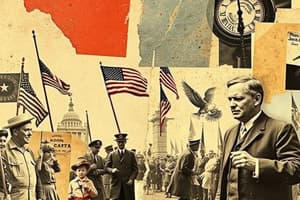Podcast
Questions and Answers
How did the Populists and the Progressives differ?
How did the Populists and the Progressives differ?
The Populists were mainly aggrieved farmers advocating radical reforms, while the Progressives were urban, middle-class reformers wanting to increase government roles in reform while maintaining a capitalist economy.
Why did Populism fail?
Why did Populism fail?
Its constituents were mostly poor farmers whose daily struggle to make a living made political activity difficult.
Why did the Progressives achieve greater success?
Why did the Progressives achieve greater success?
- They were an urban, middle-class movement. 2) Proponents had more economic and political clout than the Populists 3) They could devote more time to their causes 4) They did not intensify regional and class differences.
Who was Robert La Follette?
Who was Robert La Follette?
What is a ballot initiative?
What is a ballot initiative?
What is a referendum?
What is a referendum?
What is a recall election?
What is a recall election?
Why did Roosevelt win the 1904 election?
Why did Roosevelt win the 1904 election?
Why was Roosevelt called the 'Trustbuster'?
Why was Roosevelt called the 'Trustbuster'?
What were Roosevelt's progressive achievements?
What were Roosevelt's progressive achievements?
Who was William Howard Taft?
Who was William Howard Taft?
What is the 16th amendment?
What is the 16th amendment?
What is the 17th amendment?
What is the 17th amendment?
Why is the Progressive Era a turning point in American history?
Why is the Progressive Era a turning point in American history?
What are Roosevelt's policies often referred to as?
What are Roosevelt's policies often referred to as?
What did Wilson refer to his ideas and policies as?
What did Wilson refer to his ideas and policies as?
What role did Wilson assert government played in regulating business?
What role did Wilson assert government played in regulating business?
How did Wilson and Roosevelt differ in their views on trusts?
How did Wilson and Roosevelt differ in their views on trusts?
What stance did Wilson have on tariffs?
What stance did Wilson have on tariffs?
Name three things Wilson created.
Name three things Wilson created.
Why did Progressivism end?
Why did Progressivism end?
Flashcards are hidden until you start studying
Study Notes
Differentiating Populists and Progressives
- Populists represented primarily aggrieved farmers advocating radical reforms.
- Progressives were urban, middle-class reformers focused on enhancing government roles within a capitalist framework.
Reasons for the Failure of Populism
- Constituents were mainly poor farmers, hindering sustained political engagement.
- Economic struggles limited capacity for political activism.
Successes of the Progressive Movement
- Urban and middle-class base allowed for greater political and economic influence.
- Progressives engaged in issues with more time and resources compared to the Populists.
- The movement did not exacerbate regional and class tensions as the Populists did.
Robert La Follette's Contributions
- Influential Progressive leader in Wisconsin.
- Promoted direct primary elections, progressive taxation, and rail regulation.
Key Progressive Initiatives
- Ballot Initiative: Enabled voters to propose new laws.
- Referendum: Allowed public voting on proposed laws.
- Recall Election: Gave voters power to remove officials before term completion.
Theodore Roosevelt's Achievements
- Secured the 1904 election largely due to his management of Latin American affairs.
- Earned the title "Trustbuster" for effectively utilizing the Sherman Antitrust Act against monopolies.
- Accomplished progressive reforms, including stricter food and drug regulations and the establishment of national parks.
William Howard Taft's Legislative Efforts
- Advocated for the national income tax and direct election of senators through two constitutional amendments.
Constitutional Amendments
- 16th Amendment: Instituted a national income tax.
- 17th Amendment: Enabled direct election of senators.
Significance of the Progressive Era
- Represented a notable shift towards increased federal government involvement in citizens' lives.
Distinct Policies of Wilson and Roosevelt
- Roosevelt's policies known as "New Nationalism"; he viewed trusts as either good or bad.
- Wilson's framework termed "New Freedom"; he considered all trusts monopolies requiring regulation.
- Wilson sought to lower tariffs as part of his economic strategy.
Legislative Contributions Under Wilson
- Established the Federal Trade Commission.
- Introduced the Clayton Antitrust Act of 1914.
- Created the Federal Reserve System.
Conclusion of the Progressive Movement
- Progressivism declined due to:
- National exhaustion from World War I and the Spanish Flu.
- Fragmentation of the Progressive coalition.
- The onset of the Red Scare.
- Many of its goals had already been achieved.
Studying That Suits You
Use AI to generate personalized quizzes and flashcards to suit your learning preferences.




